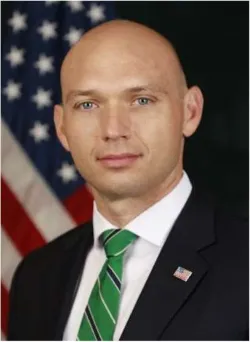The path to becoming a U.S. Customs and Border Protection (CBP) attaché is rarely conventional. As CBP Attaché Paul Posner put it, “Being an attaché requires a specific combination of knowledge, skills, and abilities.” However, each attaché has a unique journey to success.
Posner is the Regional Attaché for the Rome, Italy, Area of Responsibility. He serves as the senior diplomatic representative in the region and is responsible for promoting CBP programs, capabilities, and priorities in 11 countries in Southern Europe. Now, in his third year in the position, Posner would like potential attachés to know more about how they can reach this career goal.

serves as the senior diplomatic representative
for the 11 Southern European countries within
the Rome, Italy, Area of Responsibility.
A self-described class clown in high school, Posner possessed a keen interest in puzzles and mysteries from an early age. When the events of Sept. 11, 2001, occurred, he felt a call to action and enlisted in the U.S. Army as an Intelligence Analyst.
During his time with the Army, Posner deployed to both Afghanistan and Iraq. Posner credits his military service with instilling the values of teamwork, respect, leadership, attention to detail, and accountability.
Following the Army, Posner joined CBP as an Intelligence Research Specialist working in the Intelligence Watch. “I knew about the basics of intelligence analysis but didn’t have any institutional knowledge,” he said. “The continuous learning about the various missions and responsibilities of our agency remains one of the hardest parts of the job. Being successful in the Intelligence Watch, even at a junior level, not only requires you to have worldwide situational awareness, but also understanding how global events impact our homeland security mission.”
As Posner’s intelligence career advanced in CBP, he was afforded the opportunity to deploy internationally in support of the Attaché London office, representing CBP in interagency efforts during the 2012 Olympics. “[This position] made me really start to get interested in other cultures and the idea of living abroad.”
Later in his career, as a supervisor for the intelligence group embedded within the National Targeting Center, Posner was responsible for overseeing the representative position in Mexico City. Routine visits there provided Posner with insight on the varied role of the Attaché Office. Posner stated, “As I moved into progressively higher management roles at CBP Intel, the international component always played a front-and-center role in my mind, especially as programs and projects in the agency really began to shift the idea of our physical borders as the ’last line of defense.’”
He then served as Director of the Strategic Intelligence and Analysis Division and represented CBP intelligence in multiple international discussions. These multilateral exchanges and numerous overseas visits strengthened Posner’s interest in becoming an attaché. When completing the Department of Homeland Security’s Senior Executive Service Candidate Development Program, Posner applied and was selected for his current attaché position in Italy.
Posner believes the reason many attachés and advisors come from the CBP law enforcement officer ranks is because of their invaluable operational and front-line experience. “However, someone with a broad intelligence background can bring other strengths to the job that can be just as important.” He added, “Attaché work relies heavily on information sharing and developing partnerships, areas that should come naturally to someone coming from CBP’s intelligence areas.”
He encourages Intelligence Research Specialists and others in the CBP intelligence enterprise to become attachés. “If they can leverage the critical thinking, communication, and strategic awareness required for a job in intel and combine it with interpersonal acumen, the ability to navigate complex interagency dynamics, and the ability to self-motivate, someone coming from an intelligence background can make an extremely effective attaché.”
Posner concluded, “I love the work of being an attaché and would very happily do this job again. Having the opportunity to represent the agency in all facets has been extremely rewarding and has opened my eyes to additional areas of interest within CBP’s mission.”

